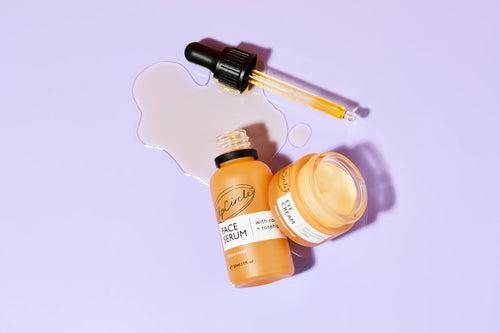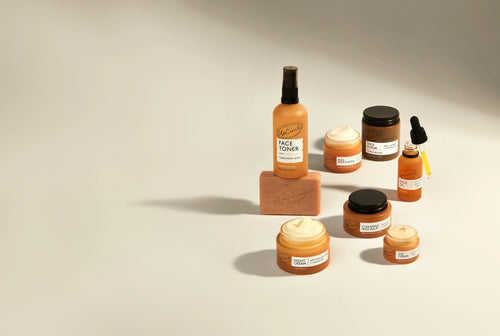SLS free skincare is becoming more and more sought after. But what actually is sodium lauryl sulfate and do we need to be concerned about SLS in skincare?
What is SLS?
Sodium lauryl sulfate (SLS) is a chemical that you’ll find in lots of different skincare products, as well as household detergent products, because it creates foam. This ability to create lather makes them a surfactant – they lower the surface water tension. That’s the chemistry behind it!
Sulfates are detergents which come from different sources, including petroleum. They are generally cheap for manufacturers to use and they create a foamy lather which has become expected in things like shampoos over the last few decades. Indeed, many of us may feel that something isn’t truly working to get us or our homes clean, if it doesn’t come with a fabulous lather.
SLS is just one type of sulfate, alongside other ones such as sodium stearyl sulfate, sodium lauryl ether sulfate (SLES) and sodium lauryl sulfoacetate (SLSA). SLS is probably the most commonly recognised sulfate, and has certainly been in the press more and more due to increasing concerns over its use.
SLS in skincare – where do you find it?
SLS is often found in a large range of skincare and beauty products. If your product foams up into a fluffy lather when water is added, take a quick peek at the ingredients and you’ll probably find that SLS is there.
SLS in skincare is typically found in shampoo, shower gel, shaving foams, toothpaste and bubble bath.
Is SLS bad?
The debate is still raging about whether SLS in skincare (or anywhere) is good or bad. There’s a lot of vested interest and some conflicting information, as lots of different studies say different things. However, in our opinion, where a debate rages like this, it’s always best to come down on the side of caution.
As such, at UpCircle we only make SLS free skincare. We don’t feel the need to add it into our products because we have found an alternative way to create lather using sodium cocoate. It’s a completely harmless ingredient which derives from coconuts.
The arguments about whether SLS is bad can be split into two parts: is it bad for you as an individual to apply it topically, and is it bad for the environment?
Is SLS bad for you?
Let’s start by looking at the concerns for you when you choose grooming and skincare products containing SLS.
Sensitivity and irritation
Many, especially those with more sensitive skin (such as those with eczema or psoriasis), find that SLS in skincare is too irritating. Surfactants wash away the natural oils on the face, which help to ensure your skincare isn’t irritated.
Whilst SLS has been deemed safe by the authorities for topical use, it’s not actually that straightforward. It is widely accepted and understood that SLS is an irritant, especially if it’s present in high amounts, or left on the skin for any length of time.
Studies show that SLS (and SLES) can be irritating to the lungs, skin and eyes, and this is notably more marked if used over a longer period of time. SLES has also been shown to be potentially contaminated with a substance that research has demonstrated causes cancer in trials with animals.
Indeed, there are several warnings from the World Health Organization (WHO) about the irritation that can be caused by SLS centring on respiratory, skin and eye irritation.
It’s not ‘natural’ skincare
There’s understandably a growing desire for skincare to be natural. There has been a notable shift towards consumers using natural ingredients which have been sourced sustainably. And if there are natural skincare products and ingredients that do the job just as well, it makes sense to avoid artificial chemicals.
Are sulfates bad for the environment?
The concerns don’t just centre on whether SLS and other sulfates are worrying for topical use. Concerns also centre on the impact on the planet. Many sulfates come from petroleum – an industry that is marred with issues surrounding greenhouse gasses, climate change and pollution.
Not all sulfates come from petroleum sources. Some are manufactured from plant bases. However, this isn’t without problems either. For example, sulfates from palm oil are associated with well-known palm oil problems including destruction of tropical rainforests.
As sulfates are known to be irritants, it is not unusual for products containing them to be tested on animals prior to reaching the market.
It’s not just production either. The sulfates in skincare and detergents are washed down the drain during use, and many believe that this is toxic to local ecosystems and aquatic life. Again, the WHO warns that SLS is toxic to aquatic life and shouldn’t be allowed to enter the environment in its raw form.
All in all, there is a huge amount of controversy surrounding sulfates. For us at UpCircle, it’s just not worth the risk of including them in our products. We don’t even see the need.
What about if it’s actually good for the skin?
We do think it’s also worth considering the arguments around SLS from the point of view of whether it’s actually good for your skin. Because, if it’s not actually bringing something good along, why do we need it?
Manufacturers like to use SLS because it helps to wash away dirt and grease. But it’s not needed for this. Indeed, we find that SLS can strip the skin of its natural oils which help to moisturize and hydrate the skin. Some research has shown that SLS can actually cause disruptions to the skin’s natural barrier that helps you weather ageing and daily exposure to toxins.
Why don’t we use SLS at UpCircle?
Given that SLS doesn’t really add anything good to skincare that you can’t get in other ways, and it may cause harm – to us and the environment – we just don’t see it has any place in our skincare range. At UpCircle, it’s important to us that we uphold our values in everything we do and everything we make, and as such, SLS has no place in that. It’s a questionable ingredient, and we want absolute confidence in the ingredients we choose.
SLS is most commonly used in face washes and shower gels. Opt for our SLS free Cleansing Face Balm with Apricot Powder and some of our Organic Chai Soaps for cleansers that clean the skin naturally, whilst being kind to the planet and kind to your skin.








